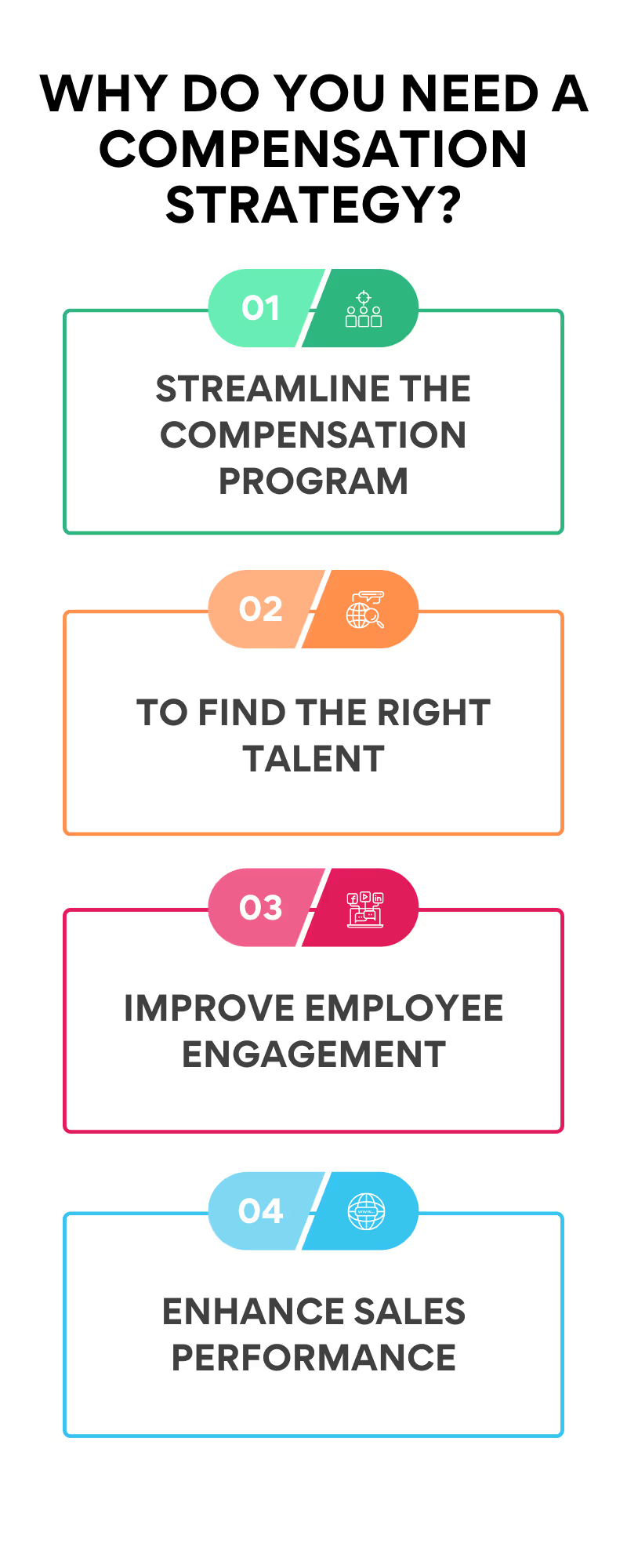
Blog
Crafting a Winning Compensation Strategy for Maximizing Success
June 14, 2023


Key Insights
Having a roadmap to company operations brings efficiency. Then why don't you have one for compensation management?
Every organization with a sales team acknowledges the fact that they are doing everything in their power to make incentive compensation management systematic.
While incorporating tools and techniques do bring a huge difference in incentive management, having a proper approach to incentive management as well as streamlining the entire process is also crucial.
That is where the compensation strategy stands prominently in sales.
If that is a term new to you, this article will take you through understanding what compensation strategy is, understand its importance, what to include in a compensation strategy, and how to design one.
So for more information, scroll down.
What is a Compensation Strategy?
The development of a comprehensive compensation strategy, specifically focusing on sales incentive compensation, plays a vital role in designing a results-driven plan that harmonizes with the company's operational framework, effectively propelling sales performance and achieving strategic objectives.
Compensation strategy draws a framework for the financial and non-financial benefits for the employees, its various components including the base and variable pay, and creates practices for building a company culture.
Why Do You Need a Compensation Strategy?

When it comes to maximizing sales performance and fostering a culture of success, establishing well-defined sales compensation models within your compensation strategy provides a structured framework to effectively drive motivation, align goals, and enhance overall efficiency within the organization.
So here are a few reasons why it's necessary to have a compensation strategy.
- Streamline the Compensation Program
As mentioned above, compensation strategy clearly defines your incentive compensation plan. The structure it gives to the organization’s compensation program also provides clarity for the company to approach each employee’s compensation plan as well as gives transparency to employees in understanding their benefits.
- To find the Right Talent
A competitive and well-defined compensation strategy will distinguish your organization from the rest in the market as well as attract the right talent for your organization. When high-performing candidates are clear about their opportunities and possibilities, they will have a higher chance of choosing your organization over your competitors or others. This underscores the importance of aligning recruitment efforts with the strategic approaches of sales planning to ensure a cohesive and compelling narrative for prospective employees.

- Improve Employee Engagement
Incentive compensation has a huge influence on improving employee engagement and performance as well as reducing turnover. A satisfied employee who knows of their organization’s compensation strategy will be committed to their responsibilities and dedicated to the organization.
- Enhance Sales Performance
The main agenda of an effective sales compensation plan is to enhance sales performance. A well-structured compensation plan gives motivation and focuses to the salesforce to improve their performance and successfully attain their quotes, often utilizing tools like a sales margin percentage calculator to ensure optimal financial outcomes.
What To Include in a Compensation Strategy?

A well-defined compensation strategy provides clarity, transparency, effectiveness, and efficiency. So here are a few tips that you have to take care to include while building your compensation strategy.
- The primary objective of creating a compensation strategy is to streamline all efforts and resources to attain the company's objectives. Hence, every component that goes into building an effective incentive compensation plan must be centered around the organizational objectives. These include base pay, variable compensation, sales quota, sales process, etc.
- The compensation strategy must be formulated so that it fulfills multiple purposes. One of the most important purposes is to reduce turnover. An effective compensation strategy will attract top talents to the organization while ensuring the current talents stay with the organization and are kept satisfied.
- A good incentive compensation plan not just provides financial rewards to their salesforce but also includes non-financial benefits. These include profit-sharing, gifts equivalent to variable pay, vacation package, etc. These rewards also reduce the financial demand while effectively using resources to keep the salesforce satisfied.
- Incorporating transparent sales incentive programs into the compensation strategy is essential, as it not only clarifies the compensation division but also provides a clear understanding to the salesforce regarding their on-target earning and the direct correlation between their efforts and the rewards they aspire to attain within specific time frames.
How to Design a Compensation Strategy?
- Clearly define company objectives
The purpose of designing a compensation strategy is to streamline incentive works to achieve the large goals of the company. Hence, organizations must first create clarity on what are their short-term and long-term goals and strategize around achieving them.
- Assess the company budget
Compensation management means money management. To plan big, one must first understand the resources available to materialize these dreams into reality. Hence, an assessment of the company budget and the amount available for incentive compensation management and other variable rewards must be made to clearly define the roadmap to strategizing plans.
- Taking the market status
Incentive compensation is very much determined by the market status. Knowledge about what your competitors offer competent candidates and employees and their incentive management including financial and non-financial rewards and other strategies help organizations design an effective compensation strategy that distinguishes as well as makes you the first choice among competent talents.
- Understand employee requirements
The recipients of incentives are the salesforce. Hence, it is their suggestions, needs, and requirements that help build a sales compensation plan and strategy that is effective in its purpose, suitable to the organizational structure and goals as well as aligned with the company’s available resources and tools.
- Built an effective incentive compensation plan
Having a thorough understanding of the organization-its structure, goals, and objectives, in-depth knowledge about the market, industry, and competitors, as well as being aware of the employees' needs and requirements help build an effective and efficient sales incentive compensation plan that fulfills all the targets the company aims to achieve.
A comprehensive knowledge of our industry, organization, and employees will give us the understanding to strategize an effective compensation program.
Conclusion
Incentive compensation is an inevitable component for ensuring enhanced salesforce performance. With all the potential it holds in bringing substantial improvement in employee motivation and performance, organizations must incorporate every possibility to ensure consistent growth and success.
Incorporating digital tools and automation of everyday tasks is the leading trend to bring in operational efficiency.
Kennect automates your incentive compensation plans to run your compensation programs in cruise mode and create transparency to achieve operational efficiency. For more information Book A Demo Today!
ReKennect : Stay ahead of the curve!
Subscribe to our bi-weekly newsletter packed with latest trends and insights on incentives.
Thank you! Your submission has been received!
Oops! Something went wrong while submitting the form.
Your data is in safe hands. Check out our Privacy policy for more info




.avif)

%20(1).avif)








